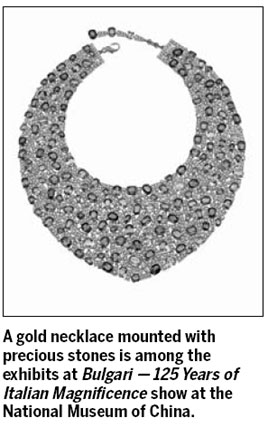Italian jewelry show whets growing craze for luxury
Updated: 2011-09-05 14:35
By Lin Qi (China Daily)
|
|||||||||||
Andy Warhol was quoted as saying in the 1960s that walking into a Bulgari shop was like visiting a contemporary art show.
Beijingers will have a chance to see if this testimonial about the Italian jeweler sparkles with truth or is lackluster, when the National Museum of China hosts a retrospective brand exhibition.
The seven-gallery Bulgari - 125 Years of Italian Magnificence show recounts different chapters of the brand's design, since founder Sotirio Bulgari opened his first shop in Rome in 1884.
It's the first time the exhibition, which was displayed in Rome's Palazzo delle Esposizioni in 2009 and at the Grand Palais in Paris last year, is shown in Asia - a continent where a burgeoning nouveau riche class is emerging and young people are infatuated with fashion and luxury brands.

The "made-in-Italy" retrospective exhibits more than 600 pieces of jewelry, watches and other precious objects, about 100 of which will be revealed to the general public for the first time. Many of the exhibits come from the historical archives of Bulgari's vintage collection, while others are on loan from private owners, including film stars.
But the exhibition is, however, more than a showcase of Bulgari's masterpieces, curator Amanda Triossi says.
She says it also celebrates the traditions of Italian art and shared universal values - the pursuit of excellence and beauty.
The event will also feature seven films and a collection of photographic documents dedicated to Bulgari's products from different periods that document changes in fashion and art.
Triossi says she hopes the exhibition will "reverse people's narrow mindset" about jewelry's lack of seriousness.
"Jewelry is trans-cultural and crosses social boundaries," she says.
"By examining the color and shape of a piece of jewelry, one can appreciate how the human brain is working. No matter (whether one is a) man or woman, people wear jewelry as a way to keep their identities and to stay true to themselves."
She says there were many touching moments during the exhibitions in Europe.
She recalls asking to borrow a piece a US customer had purchased for his wife and first showed to her at the display. "On the opening night of the exhibition, the wife saw the necklace in the glass box with a notice board (printed with) her name," she says.
"She was overjoyed and moved to tears."
Triossi says she has inherited her passion for jewelry from her grandfather. "When my grandpa came to visit us, he would take me to window shop at the (Bulgari) store," she says.
Triossi, who earned a master's in art history at Cambridge University, also compiled a Chinese-Italian catalogue to accompany the exhibition.She worked with many professors from both countries to put on this show. And she will bring two of them from Ca' Foscari University of Venice to speak at a forum on Chinese and Italian art and culture at the museum on Sunday.
The exhibition will run until Nov 3.